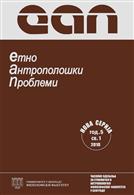Prihvatanje evropskih standarda u oblasti ekonomskog prava i (anticipirane) kulturne promene u Republici Srbiji
The Adoption of European Standards in the Sphere of Economic Law and (Anticipated) Cultural Change in Serbia
Author(s): Marko MilenkovićSubject(s): National Economy, Government/Political systems, Economic development, Law on Economics, EU-Approach / EU-Accession / EU-Development, EU-Legislation
Published by: Филозофски факултет, Универзитет у Београду
Keywords: law as instrument; cultural change; transition; harmonization of legislation; Republic of Serbia; EU; legal transplants; competition; government subsidy; visa liberalization; freedom of movement;
Summary/Abstract: Serbian society has undergone significant changes over the last ten years. The transformation of the legal system has taken place mostly through the process of European integrations and harmonization of legislation with the EU legal order. The primary focus of the paper is on the study of (anticipated) cultural change which is brought about by changes in economic law. By studying changing attitudes to business operation, the paper seeks to answer the questions of whether we can learn something about cultural change by analyzing economic law and whether we are witnessing the transformation of Serbian citizens into "European citizens", consumers, businessmen, farmers, bureaucrats or politicians. Some of these changes are already in evidence, and it can be said that considerable progress has already been made. Nevertheless, in most areas reforms have yet to be enacted, and therefore this transformation along with its outcome and results can only be anticipated. Following an overview of the Stabilization and Association Process, the signing of the Stabilization and Association Agreement (SAA), and the process of harmonization of legislation and monitored reforms, the paper goes on to analyze whether and to what extent the following have taken place: 1) the opening up of the Serbian economy to foreign competition (primarily European), 2) the implementation of reforms and the introduction of competition rights and government subsidy control, 3) changes in rural Serbia as part of the process of preparation for accession to the EU. It can be concluded that European integrations and the adoption of a series of different standards represent an instrumental framework for significant cultural change in Serbian society. The change will be fundamental and will take long to bring about. For this reason it can only be partially anticipated what its effects will be and whether and to what extent changes will be accomplished in each of the areas mentioned.
Journal: Етноантрополошки проблеми
- Issue Year: 5/2010
- Issue No: 1
- Page Range: 111-135
- Page Count: 25
- Language: Serbian

